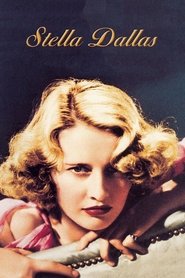Something of a remake of a 1925 silent version directed by Henry King and based on the novel by Massachusetts author by Olive Higgins Prouty, this so-called "woman's weepie" has a decided charm. The pleasure of this film is not limited to its famous closing sequence; there are some nice touches sprinkled throughout, such as the gently-handled scene in which Lollie is literally wielding a knife when she talks to Stella about how much she likes Mrs Morrison.
Like many films of Depression-era Hollywood, Stella Dallas indulges the audience's thirst to see wonderful costumes and decor, yet the film never fails to elevate the perspective and morality of the class-climbing Stella. Indeed, the screenplay often relies on the audience being as class-conscious as our protagonist is. Yet alas, not consistently — take the rather heavy-handed insults aimed at Stella by the teenagers when even a few opprobrious looks would have sufficed for the viewers (and Stella) to get the message.
Ultimately, this is a film that, without becoming overly saccharine, is about how difficult and meaningful hard decisions in this world exist even in the presence of material plenty and the absense of overt evil.
In the final scene of Stella Dallas (1925) [NB. the previous adaptation], the title character stands in a dark city street in the rain, peering through a window at her daughter’s wedding. This famous image inescapably suggests a viewer gazing at a movie screen: the lighted square of the window, framed by lace-trimmed drapes, even closely matches the aspect ratio of films from the time. This resemblance adds a subtle element of self-commentary to the scene, in which Stella is both punished and exalted. [And] watching Stella watch her daughter’s picture-perfect wedding to a rich, handsome man, weeping in the dark as she weeps in the dark, the female viewer is complicit in an emotional ritual that can feel both manipulative and validating.[…]
Stella Dallas is both a textbook example of the “woman’s weepie,” and a rebuke to this condescending and reductive label. Over the past few decades, great progress has been made in reclaiming the melodrama and the woman’s picture from the critical contempt in which they were once held. Yet the question Molly Haskell asked in her groundbreaking 1974 book From Reverence to Rape remains valid: “What more damning comment on the relations between men and women in America than the very notion of something called the ‘woman’s film’?” Only in America, she points out, were films about relationships, romance, and family herded into a gendered ghetto.
— Imogen Sara Smith (Mubi)

